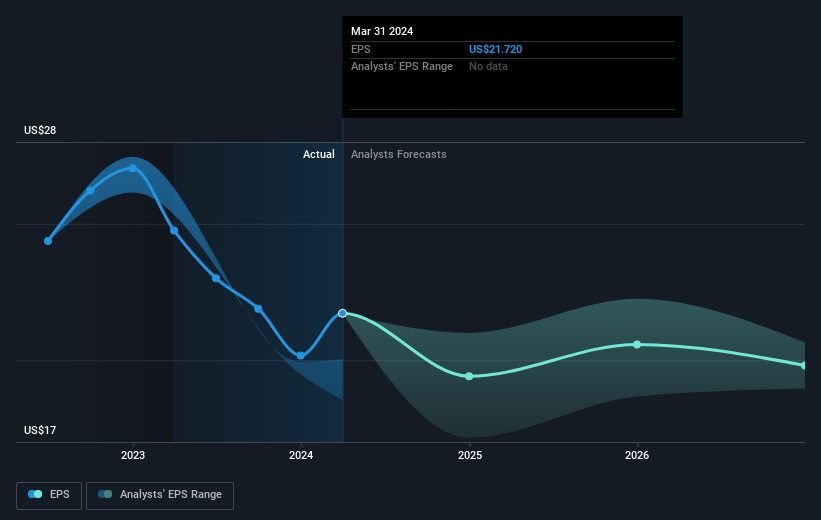Stock Analysis
- United States
- /
- Consumer Durables
- /
- NYSE:MTH
Meritage Homes' (NYSE:MTH) five-year earnings growth trails the splendid shareholder returns

The worst result, after buying shares in a company (assuming no leverage), would be if you lose all the money you put in. But when you pick a company that is really flourishing, you can make more than 100%. One great example is Meritage Homes Corporation (NYSE:MTH) which saw its share price drive 221% higher over five years. And in the last week the share price has popped 11%. This could be related to the recent financial results, released less than a week ago -- you can catch up on the most recent data by reading our company report.
Since the stock has added US$625m to its market cap in the past week alone, let's see if underlying performance has been driving long-term returns.
View our latest analysis for Meritage Homes
There is no denying that markets are sometimes efficient, but prices do not always reflect underlying business performance. One way to examine how market sentiment has changed over time is to look at the interaction between a company's share price and its earnings per share (EPS).
Over half a decade, Meritage Homes managed to grow its earnings per share at 33% a year. The EPS growth is more impressive than the yearly share price gain of 26% over the same period. So one could conclude that the broader market has become more cautious towards the stock. The reasonably low P/E ratio of 7.72 also suggests market apprehension.
You can see how EPS has changed over time in the image below (click on the chart to see the exact values).

Before buying or selling a stock, we always recommend a close examination of historic growth trends, available here.
What About Dividends?
When looking at investment returns, it is important to consider the difference between total shareholder return (TSR) and share price return. Whereas the share price return only reflects the change in the share price, the TSR includes the value of dividends (assuming they were reinvested) and the benefit of any discounted capital raising or spin-off. It's fair to say that the TSR gives a more complete picture for stocks that pay a dividend. We note that for Meritage Homes the TSR over the last 5 years was 226%, which is better than the share price return mentioned above. This is largely a result of its dividend payments!
A Different Perspective
It's nice to see that Meritage Homes shareholders have received a total shareholder return of 36% over the last year. And that does include the dividend. That's better than the annualised return of 27% over half a decade, implying that the company is doing better recently. In the best case scenario, this may hint at some real business momentum, implying that now could be a great time to delve deeper. It's always interesting to track share price performance over the longer term. But to understand Meritage Homes better, we need to consider many other factors. Like risks, for instance. Every company has them, and we've spotted 3 warning signs for Meritage Homes (of which 1 is concerning!) you should know about.
Of course, you might find a fantastic investment by looking elsewhere. So take a peek at this free list of companies we expect will grow earnings.
Please note, the market returns quoted in this article reflect the market weighted average returns of stocks that currently trade on American exchanges.
Valuation is complex, but we're helping make it simple.
Find out whether Meritage Homes is potentially over or undervalued by checking out our comprehensive analysis, which includes fair value estimates, risks and warnings, dividends, insider transactions and financial health.
View the Free AnalysisHave feedback on this article? Concerned about the content? Get in touch with us directly. Alternatively, email editorial-team (at) simplywallst.com.
This article by Simply Wall St is general in nature. We provide commentary based on historical data and analyst forecasts only using an unbiased methodology and our articles are not intended to be financial advice. It does not constitute a recommendation to buy or sell any stock, and does not take account of your objectives, or your financial situation. We aim to bring you long-term focused analysis driven by fundamental data. Note that our analysis may not factor in the latest price-sensitive company announcements or qualitative material. Simply Wall St has no position in any stocks mentioned.
About NYSE:MTH
Meritage Homes
Designs and builds single-family attached and detached homes in the United States.
Undervalued with excellent balance sheet.


